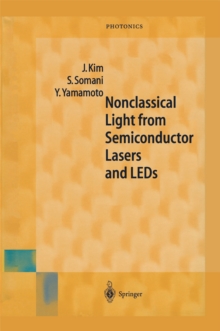
Nonclassical Light from Semiconductor Lasers and LEDs Hardback
by Jungsang Kim, Seema Somani, Yoshihisa Yamamoto
Part of the Springer Series in Photonics series
Hardback
Description
The quantum statistical properties of light generated in a semiconductor laser and a light-emitting diode (LED) have been a ?eld of intense research for more than a decade.
This research monograph discusses recent research activities in nonclassical light generation based on semiconductor devices, performed mostly at Stanford University.
When a semiconductor material is used as the active medium to generate photons, as in semiconductor lasers and LEDs, the ?ow of carriers (electrons andholes)isconvertedintoa?owofphotons.
Providedthattheconversionis fast and e?cient, the statistical properties of the carriers (“pump noise”) can be transferred to the photons; if pump noise can be suppressed to below the shot noise value, the noise in the photon output can also be suppressed below thePoissonlimit.
Sinceelectronsandholesarefermionsandhavecharges,the statisticalpropertiesoftheseparticlescanbesigni?cantlydi?erentfromthose of photons if the structure of the light-emitting device is properly designed to provide interaction between these particles.
There has been a discrepancy between the theoretical understanding and experimental observation of noise in a macroscopic resistor until very - cently.
The dissipation that electrons experience in a resistor is expected to accompany the ?uctuation due to partition noise, leading to shot noise in the large dissipation limit as is the case with photons.
Experimental observation shows that thermal noise, expected only in a thermal-equilibrium situation (zero-bias condition), is the only source of noise featured by a resistor, - dependent of the current.
Information
-
Item not Available
- Format:Hardback
- Pages:244 pages, XIV, 244 p.
- Publisher:Springer-Verlag Berlin and Heidelberg GmbH & Co. K
- Publication Date:28/08/2001
- Category:
- ISBN:9783540677178
Other Formats
- PDF from £110.08
- Paperback / softback from £95.55
Information
-
Item not Available
- Format:Hardback
- Pages:244 pages, XIV, 244 p.
- Publisher:Springer-Verlag Berlin and Heidelberg GmbH & Co. K
- Publication Date:28/08/2001
- Category:
- ISBN:9783540677178










